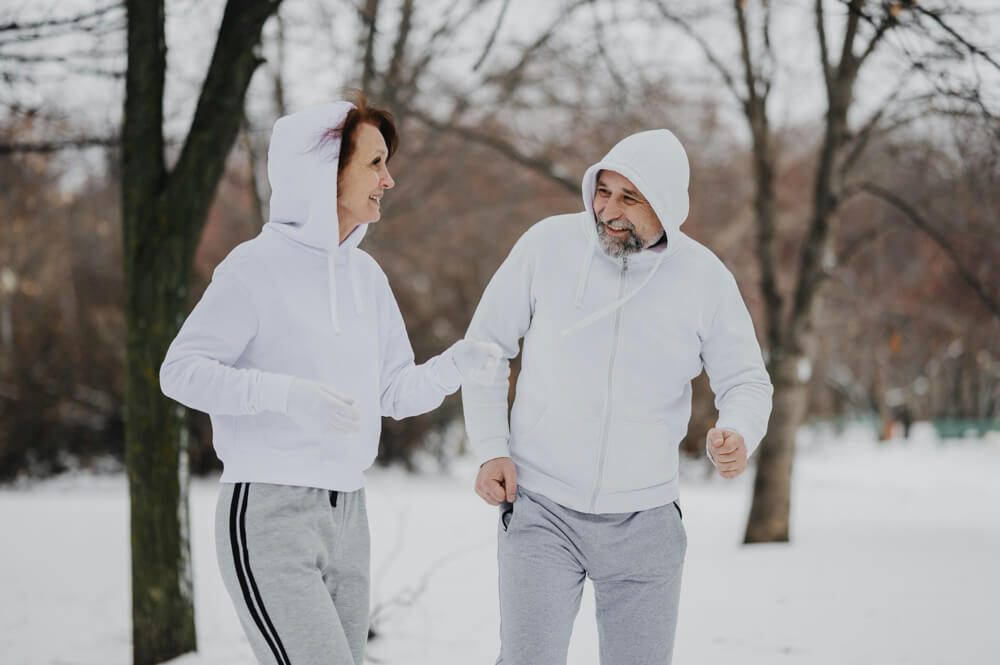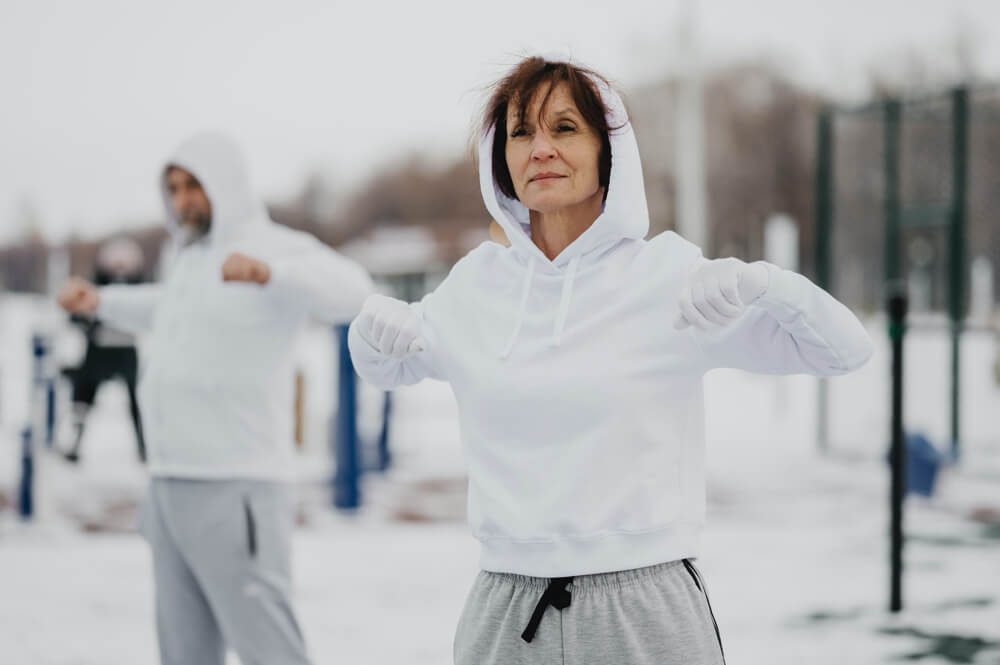- Fast results
- 4,000+ locations
- 4.8 star rating
Need Help? (888) GET LABS



The cold breeze and limited sunlight of winter may bring a feeling of sadness and lethargy for some people. It’s easy to think that it’s all in the mind, but there is a science behind it. Like any other season, winter has its boons and banes when it comes to your overall health. Thus, to maintain optimum well-being in colder weather, here are seven winter health and wellness tips and why they work.
When people say that they feel sadder during winter, it’s not just a myth. There is a condition called seasonal affective disorder (SAD)(1), which is characterized by depressive symptoms usually experienced during a specific time of the year, mainly during the cold season.
A good way to address SAD is to first recognize its likelihood to occur. If you experience a sudden dip in your mental health for no reason, consider talking to a specialist, especially if the symptoms get worse.
Avoid too much isolation. Schedule times for activities that can lift your mood, like dining out, going skiing, or having game nights. Use technology to connect to people who matter most in your life. For example, set up a conference call to catch up with your friends.
It is observed that cases of low vitamin D(2) are observed during seasons when the sun is not exposed. Due to the limited sunlight during winter, your vitamin D levels may also drop, especially if you have a deficiency to begin with or if you’re not taking supplements.
It is imperative to keep track of your vitamin D levels during winter as its deficiency may cause health consequences, such as muscle weakness, mood swings, fatigue, and bone issues. If you experience low vitamin D symptoms, like muscle and bone pain, the “pin-and-needles sensation in your extremities, and spasms, see your doctor so you can take the necessary tests, including the vitamin D 25-hydroxy blood test.
Also Read: 5 Incredible Reasons Why You Need Sufficient Vitamin D

The cold weather may bring some health benefits. But it does not change the fact that it can also increase your risk of illnesses, such as stroke, pneumonia, and even heart attacks. This is because the cold environment narrows blood vessels (3), causing the heart to work twice as hard when pumping blood.
On top of the impact of cold weather on your cardiovascular system, there’s hypothermia(4) that you should avoid at all costs. Naturally, to ensure you’re keeping yourself safe from these drastic health consequences of winter, you must dress accordingly. Choose winter attires that keep you insulated, like layered shirts, puffer jackets, coats, and thermal wear.
Aside from having the right wardrobe for the weather, you can protect yourself further from common illnesses and the blues of winter if you restrict exposure to outdoor conditions. Of course, this is a no-brainer response to the cold weather, but it needs reminders occasionally. When you have to spend considerable time outdoors, then do not feel unwell, for you may risk complicating yourself with the consequences.
Just because you need to be cooped up most of the time doesn’t mean you can’t do things to get active. So you may not have your jogging route, temporarily at least, but workouts are a go, either at the gym or in your own home. Make sure to design physical activities that suit the winter season.
Also Read: 12 Light Physical Activities You Can Do at Home
Expect to have less moisture in your skin when the weather is cold. This is because the environment becomes significantly drier during winter, which leaves your skin less radiant. Even when you stay indoors, the dry heat inside and low humidity levels influence your skin’s dryness(5).
Regardless if you have a close affinity to skin problems, being more mindful of your skin health during winter is crucial. Observe any winter rashes, and don’t hold back on consulting your doctor. Apply moisturizers or oil to your skin to alleviate the dryness and help you recover the lost nutrients.
Among many animals, winter is when they hibernate. While humans don’t necessarily take after this pattern, we are also called to pay more attention to the quality and quantity of our sleep during the cold season.
In addition to these changes in our metabolism and cardiovascular health, winter may bring us closer to some illnesses. When we are sleep-deprived during this time of the year, the chances that our physical and mental health will be jeopardized become high.
As an act of protecting your health and wellness during winter, secure seven to eight hours of sleep. If you’re having trouble in this area due to recurring stress, check our guide on how to sleep better when you’re anxious.
Also Read: 6 Practical Ways to Get Rid of Winter Fatigue

Some things that might seem second nature for winter are just plain good health and wellness advice to follow any time of the year to help keep yourself fit and disease-free in the winter months. What you can do to stave off illnesses during colder temperatures includes the usual health recommendations, like eating healthy foods, exercising, obtaining appropriate vaccines, staying hydrated, and ensuring you get enough sleep.
There are no special steps one must take to keep the body clean during winter beyond the usual hygiene process, similar to preventing diseases. That means you should still be bathing or taking showers — less than in other seasons since your skin will already be drier, but still. Maintain routine handwashing and other cleanliness measures.
As old man winter sets in, self-care becomes even more important because it helps equip you for common and subtle physical attitudes and mental inclinations people experience when winter hits. A tailored self-care routine can help minimize the impact of seasonal affective disorder, lethargy, fatigue, and other changes that may influence your overall health and wellness.
While many practices for health and wellness apply perennially, it’s essential to understand that some adjustments must be made based on season. In the case of winter, actions like being more mindful of the winter blues and getting more vitamin D may be amplified, given the impact of the environment on factors driving these consequences.
1 Munir S, Gunturu S, Abbas M. Seasonal Affective Disorder. 2024 Apr 20. In: StatPearls [Internet]. Treasure Island (FL): StatPearls Publishing; 2024 Jan–. PMID: 33760504.
2 Oliosa PR, Oliosa EMR, Alvim RO, Sartório CL, Zaniqueli DDA, Mill JG. Association of sun exposure and seasonality with vitamin D levels in Brazilian children and adolescents. Rev Paul Pediatr. 2023 Mar 3;41:e2021361. doi: 10.1590/1984-0462/2023/41/2021361. PMID: 36888750; PMCID: PMC9984152.
3 Vaičiulis V, Jaakkola JJK, Radišauskas R, Tamošiūnas A, Lukšienė D, Ryti NRI. Risk of ischemic and hemorrhagic stroke in relation to cold spells in four seasons. BMC Public Health. 2023 Mar 23;23(1):554. doi: 10.1186/s12889-023-15459-4. PMID: 36959548; PMCID: PMC10037875.
4 Duong H, Patel G. Hypothermia. 2024 Jan 19. In: StatPearls [Internet]. Treasure Island (FL): StatPearls Publishing; 2024 Jan–. PMID: 31424823.
5 Park EH, Jo DJ, Jeon HW, Na SJ. Effects of winter indoor environment on the skin: Unveiling skin condition changes in Korea. Skin Res Technol. 2023 Jun;29(6):e13397. doi: 10.1111/srt.13397. PMID: 37357654; PMCID: PMC10264749.

© Copyright 2025 Personalabs. All Rights Reserved.